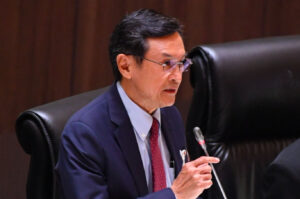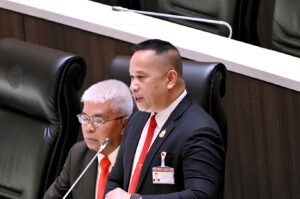แถลงการณ์พรรคเพื่อไทย ต่อระบบการเลือกตั้งที่จะนำมาใช้
ตามที่ คณะกรรมการร่างรัฐธรรมนูญ
(กรธ.) มีแนวคิดที่จะนำระบบเลือกตั้งที่เรียกว่า “ระบบจัดสรรปันส่วนผสม” มาใช้
โดยกำหนดมี ส.ส. ทั้งแบบแบ่งเขต และบัญชีรายชื่อ แต่ใช้บัตรเลือกตั้งใบเดียว โดยจะนำคะแนนของผู้ที่แพ้การเลือกตั้งแบบแบ่งเขตไปคำนวณเพื่อหาจำนวนที่นั่งของ
ส.ส. แบบบัญชีรายชื่อ ส่วนคะแนนที่ชนะการเลือกตั้งแบบแบ่งเขตจะถูกตัดทิ้ง
ไม่นำมาคำนวณในส่วนของ ส.ส. แบบบัญชีรายชื่ออีก ซึ่งเป็นระบบที่ไม่เคย มีใช้มาก่อนในประเทศใด
พรรคเพื่อไทยได้พิจารณาแล้วมีความเห็น
ดังนี้
1. การพิจารณาว่าจะนำระบบการเลือกตั้งแบบใดมาใช้นั้น
ควรต้องพิจารณาปัจจัยด้านต่างๆ และผลกระทบที่จะตามมาอย่างรอบด้าน เช่น
โอกาสและความเท่าเทียมกันของพรรคการเมืองในการส่งผู้สมัคร ความต้องการของประชาชน
ความมีประสิทธิภาพและเสถียรภาพของรัฐบาลหลังการเลือกตั้ง เป็นต้น นอกจากนี้ต้องเป็นระบบที่จะ เกิดประโยชน์กับประเทศชาติและประชาชนโดยส่วนรวมมากที่สุด
ไม่ใช่ระบบที่จะก่อให้เกิดปัญหาต่างๆ ตามมา
2. เมื่อ
กรธ. กำหนดให้มี ส.ส. สองประเภท ก็ควรให้ประชาชนได้แสดงเจตนาในการเลือกตั้ง ตามประเภทของ
ส.ส. และวัตถุประสงค์ของการเลือกตั้งแต่ละประเภท ดังกล่าว
แต่การใช้บัตรเลือกตั้งใบเดียว
ให้เลือกผู้สมัครและพรรคการเมืองไปพร้อมกันจึงไม่อาจทราบถึงความต้องการของประชาชนได้ว่าที่ลงคะแนนไปนั้น
ประสงค์ จะเลือกผู้สมัครหรือเลือกพรรคการเมือง
จึงเป็นการจำกัดสิทธิประชาชน ที่ประสงค์ที่จะเลือกผู้สมัครที่ตนรัก และเลือกพรรคที่ตนชอบ
หรือประสงค์จะเลือกพรรคแต่ไม่ประสงค์จะเลือกตัวบุคคล
เพราะในทางปฏิบัติประชาชนอาจไม่ชอบผู้สมัคร แต่ชอบพรรค ชอบพรรคแต่ไม่ชอบผู้สมัคร ระบบนี้จึงไม่ได้สะท้อนความต้องการอันแท้จริงของประชาชน
3. การใช้บัตรเลือกตั้งใบเดียว ไม่สามารถหยั่งรู้ได้ว่าผู้เลือกตั้งต้องการสนับสนุนตัวบุคคล
หรือพรรค การตัดคะแนนผู้สมัครที่ชนะเลือกตั้งในเขตทิ้งไป
และนำเฉพาะคะแนนของผู้สมัครที่แพ้เลือกตั้งไปคำนวณจำนวน ส.ส.ในระบบบัญชีรายชื่อ
จะเป็นการสร้างความสับสนให้กับประชาชนเสียมากกว่า ประชาชนอาจเลือกผู้สมัคร แต่ไม่เลือกพรรค
เลือกพรรคแต่ไม่เลือกผู้สมัคร หรือเลือกทั้งพรรคและผู้สมัคร
แต่คะแนนที่เลือกพรรคกลับถูกตัดทิ้งไป ข้ออ้างที่ว่าเคารพทุกคะแนนที่ประชาชนเลือกจึงไม่จริง
ระบบนี้จึงไม่มีความเป็นธรรม และที่น่าเป็นห่วงมาก คือ พรรคที่ชนะการเลือกตั้งในระบบเขตมีจำนวน
ส.ส. มากอาจไม่ใช่ พรรคเสียงข้างมากในสภา
เพราะถูกตัดคะแนนในระบบบัญชีรายชื่อออกไปหมด
4. ระบบการเลือกตั้งแบบผสมที่กำหนดไว้ในรัฐธรรมนูญปี 2540 และ 2550 นั้น
ได้เคยนำมาใช้ในการเลือกตั้งทั่วไปแล้วหลายครั้ง
ซึ่งประชาชนมีความคุ้นเคยและออกมาใช้สิทธิเลือกตั้งในสัดส่วนที่เพิ่มมากขึ้นตลอด
ซึ่งระบบการเลือกตั้ง การแบ่งเขตและการคิดคะแนน ก็สะท้อนถึงความต้องการของประชาชนอย่างชัดเจนว่าจะเลือกผู้สมัครหรือพรรคการเมืองใด
พรรคการเมืองต่างก็แข่งขันกันด้านนโยบายมากขึ้น
แต่ระบบเลือกตั้งแบบจัดสรรปันส่วนผสมที่นำเสนอนั้น
ไม่เปิดโอกาสให้ประชาชนได้ตัดสินใจว่าจะเลือกผู้สมัครหรือพรรคการเมือง อันผิดไปจากวัตถุประสงค์ของการเลือกตั้ง
และระบบนี้จะทำให้พรรคการเมืองไม่ต้องแข่งขันกันด้านนโยบายมากนัก เพราะถึง จะแพ้การเลือกตั้งก็นำคะแนนที่แพ้มาคำนวณจำนวน
ส.ส. แบบบัญชีรายชื่อได้อยู่แล้ว
5. ระบบจัดสรรปันส่วน
(APPORTIONMENT) ไม่ใช่ระบบสัดส่วน
(PROPORTIONAL REPRESENTATION)ซึ่งเป็นระบบที่แท้จริงในการสะท้อนทุกคะแนนไม่ให้สูญเปล่า
เพราะจะนับคะแนน ที่ประชาชนลงคะแนนให้แต่ละพรรค
(POPULAR VOTES) แล้วคำนวณที่นั่ง ส.ส.
ตามสัดส่วนคะแนนที่แต่ละพรรคได้มาทั้งประเทศ
ดังนั้นระบบจัดสรรปันส่วนจึงไม่ให้ความเป็นธรรมและสะท้อนความนิยมของพรรคอย่างแท้จริง
6. ระบบจัดสรรปันส่วนผสม
ไม่ได้ส่งผลให้การซื้อสิทธิขายเสียงลดน้อยลงแต่อย่างใด เพราะเมื่อใช้ บัตรเลือกตั้งใบเดียว
ก็ยิ่งจะทำให้การซื้อสิทธิขายเสียงทำได้ง่ายขึ้น
ต่างจากระบบผสมที่กำหนดให้การเลือกตั้งแบบบัญชีรายชื่อใช้เขตประเทศเป็นเขตเลือกตั้ง
ซึ่งเป็นเขตเลือกตั้งใหญ่ นอกจากนี้ การซื้อสิทธิขายเสียงจะมากหรือน้อย ก็ขึ้นอยู่กับมาตรการทางกฎหมายและองค์กรที่ทำหน้าที่จัดการเลือกตั้งมากกว่าที่จะขึ้นอยู่กับระบบการเลือกตั้ง
7. กรธ.ตั้งใจว่าจะร่างรัฐธรรมนูญให้เป็นสากล
แต่ระบบจัดสรรปันส่วนไม่เป็นสากล และ กรธ. น่าจะ ฉุกคิดได้ว่าทำไมประเทศแม่แบบประชาธิปไตยและประเทศที่เจริญทั้งทางวัตถุและการเมืองจึงไม่ใช้ระบบนี้ในการเลือกตั้ง
การกล่าวอ้างว่าไทยไม่จำเป็นต้องลอกตำราฝรั่งนั้น ต้องถามว่าระบบรัฐสภา
องค์กรอิสระ การแบ่งแยกอำนาจ สิทธิเสรีภาพประชาชน การอภิปรายไม่ไว้วางใจ การยุบสภา
การจัดทำประมวลกฎหมายแพ่งและพาณิชย์ เราคิดเองหรือนำองค์ความรู้มาจากต่างประเทศ
?
8. พรรคเพื่อไทยเห็นว่าปัญหาของการเมืองที่เกิดขึ้นไม่ใช่เป็นเพราะระบบการเลือกตั้งที่ผ่านมาไม่ดี
แต่เกิดจากปัจจัยอื่น เช่น ปัญหาที่ผู้แพ้การเลือกตั้งไม่ยอมรับผลการเลือกตั้ง
และใช้วิธีการเพื่อบั่นทอนเสถียรภาพของรัฐบาลที่มาจากการเลือกตั้ง
การใช้องค์กรและกระบวนการยุติธรรมที่ไม่เสมอภาคเท่าเทียมกันเป็นต้น ระบบเลือกตั้งแบบผสมที่ใช้ในอดีตนั้นมีข้อดีมากกว่า
แม้จะมีข้ออ้างว่ารัฐบาลเข้มแข็งเกินไปก็ไม่ใช่ว่าจะต้องเปลี่ยนระบบการเลือกตั้ง
เพื่อให้รัฐบาลอ่อนแอลง แต่ควรไปแก้ที่สาเหตุของปัญหา เช่น
เพิ่มระบบการตรวจสอบที่เข้มแข็งขึ้น สร้างระบบการตรวจสอบถ่วงดุลยระหว่างองค์กรที่ใช้อำนาจให้เหมาะสม
เป็นต้น
พรรคเพื่อไทยจึงเห็นว่า
ระบบการเลือกตั้งแบบจัดสรรปันส่วนผสม ไม่ใช่เป็นระบบที่เป็นสากล
และไม่ใช่ระบบที่เหมาะสมกับประเทศไทย และการเมืองไทยแต่อย่างใด
เป็นระบบที่จะสร้างปัญหามากกว่าจะแก้ปัญหา ระบบที่ กรธ. จะนำมาใช้นั้น
ยังไม่เคยใช้มาก่อน ควรต้องศึกษา ผลดี ผลเสีย และผลกระทบที่จะเกิดขึ้นให้ถ่องแท้
เนื่องจากประเทศชาติไม่ใช่เครื่องทดลองทางความคิดของ กรธ.
ที่คิดอะไรได้ก็จะนำมาใช้ทันที ระบบการเลือกตั้งที่เหมาะสมกับประเทศไทยนั้น
ควรใช้ระบบการเลือกตั้งแบบผสม ตามรัฐธรรมนูญ 2540 หรือ 2550 เป็นหลัก
เนื่องจากเป็นระบบการเลือกตั้งที่สะท้อนเจตนารมณ์ของประชาชน และเปิดโอกาสให้เลือกทั้งคน
และพรรค โดยไม่ตัดคะแนนใดๆ ที่ประชาชนมอบให้ไม่ว่าจะเป็นพรรคที่แพ้เลือกตั้งหรือที่ชนะเลือกตั้งก็ตาม
พรรคเพื่อไทย
5 พฤศจิกายน 2558
Announcement
by Pheu Thai Party
regarding
the proposed electoral system
According
to the idea put forward by the Constitution Drafting Committee (CDC) to adopt
an electoral system called “Mixed Apportionment System” with constituency and
party list MPs but only has a single ballot and the votes of the losing
constituency candidates will be used to calculate the allocation of seats for
party list MPs while the votes of the winning constituency candidate will be
disregarded and not be used to calculate the seats of the party list MPs. Such
system has never been used in any other countries before.
Pheu Thai Party have considered the
matter and has the following opinions:
1.
When considering which electoral
system should be adopted it is necessary to thoroughly consider the various
factors and effects such as the opportunity and equality of the political
parties in sending their candidates, the will of the people, the efficiency and
the stability of the government after the election. Also the system must be most
beneficial to the nation and the people and not a system that will cause
further problems.
2.
Since the CDC has determined that
there will be two types of MPs it should let the people to show their electoral
intention in accordance with the type of MP and the electoral objective for
each type. By using only a single ballot to select both the candidate and the
political party thus cannot ascertain the will of the people whether they have
voted for the candidate of the political party. This undermines the rights of
the people that seek to select the candidate that they love and select the
party that they like or prefer to only select the party but not select any
candidate. This is because in reality the people may not like the candidate but
like the political party or vice versa. The system thus cannot reflect the true
will of the people.
3.
Using a single ballot also cannot ascertain
whether the voter intend to support the candidate or the party. By ignoring the
votes of the winning candidate in the constituency and using the votes of the
losing candidate to calculate the number of party list MPs will only create more
confusion for the people. This is because the people may have selected the
candidate but not the party or selected the party but not the candidate or chose
to select both the party and the candidate but this vote for the party is
ignored. Thus the claim that this method respect every vote cast by the people
is false and the system not free and fair. It is also worrisome that the political
party that won the most constituency MPs may not become the party with the
majority in the parliament because these votes were disregarded in the calculation
of party list MPs.
4.
The mixed electoral system that was
formulated in the 1997 and 2007 Constitution have been used many times in past general
elections and the people have grown accustomed and consistently come out to
exercise their electoral rights in growing numbers. This electoral system with
constituencies and vote counting clearly reflected the will of the people as to
which candidate or the party they wanted. This has made the political parties
compete more with one another concerning their policies. However this proposed apportionment
electoral system does not give the people any opportunity to decide on the
candidate or the political party which defeats the purpose of the election. It
also makes the political parties compete less on their policies because even
though they may lose the election the losing votes would nonetheless be used to
calculate the number of party list MPs.
5.
This electoral system is
“Apportionment” and not “Proportional representation” which is the true system
that can reflect every votes because it counts the votes cast by the people for
the various political parties (Popular votes) which is then used to calculate
the seats for the MPs in proportion to the votes garnered nationwide by the
party. Thus this Mixed Apportionment System is unfair and fails to reflect the
true preference for the each political party.
6.
Also this Mixed Apportionment System does
not lessen vote buying but instead makes vote buying
easier since only a single ballot is used. This is in contrast with the mixed
system that assigned the entire nation as the electoral constituency which is
the largest constituency for the party list. Also the increase or decrease in vote
buying actually depend onlegal measures and the agencies
that organizes the election more than the electoral system.
7.
The CDC is determined to draft a
constitution that is internationally accepted but this Mixed Apportionment
System is contradictory and the CDC should at least have an inkling why other
nations that are archetypes of democracy and other materially and politically
developed nations never adopted such system in their elections. By citing that
Thailand “does not need to borrow from foreign textbooks” one has to ask
whether the parliamentary system, the independent organizations, the division of
power, the rights of the people, the censure debate, the dissolution of the
parliament and the drafting of the civil and commercial code is thought out by
us or have we adopted from foreign knowledge?
8.
Pheu Thai Party sees that the
political problem that came about were not because the electoral system was flawed
but rather stemmed from other factors such as the loser of the election refuse
to accept the result and used various means to undermined the stability of the
elected government or the use of agencies and the justice process that is
biased. The mixed electoral system that has been adopted in the past has more
advantages and the claim that it will allow the government to become too strong
does not necessary mean that the electoral system need to be changed so that
the government would be made weakened. Rather the true cause of the problem
should be addressed such as strengthening the monitoring system and creating a
system that appropriately check the balance of power exercised by the various
organizations.
Pheu Thai Party sees that this Mixed Apportionment Electoral
System is not only internationally unacceptable but is not appropriate for
Thailand and Thai politics either. This system is poised to create more
problems that it can help solve. Thus the electoral system that the CDC seek to
adopt has never been used before and should the pros and cons and the
consequences should be thoroughly considered as the nation is not a testing
ground for the various thought experiment conjured up by the CDC. The
appropriate electoral system for Thailand should adopt a mixed system as per
the 1997 or the 2007 Constitution since it can reflect the will of the people
and give opportunity for the candidates and the parties without ignoring any
votes that have been cast by the people to the parties despite of losing or
winning the election.
Pheu Thai Party
5th November 2015







